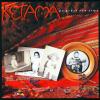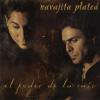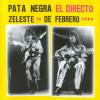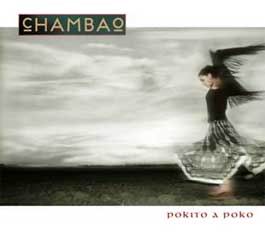
- Contact |
-
Phone |
(+34) 91 542 72 51.
We’re open from Monday – Friday 10h-13:30h / 17:00-20:00h and Saturdays 10h-13:30h (GMT + 1).
In 2022, we will be closed for holidays the 1st and 6th January, 14th, 15th and 16th April, 2nd and 16th May, 25th July, 12th October, 16th August, 1st and 9th November, 6th, 8th , 9th and 26th December.
Our shop is located in Calle Campomanes nº 4, Madrid 28013 España (Ópera Metro Station) - Help |
- Price list |
- Order situation |
- Wholesalers Access
- 🚚 📦 WORLDWIDE SHIPPING ✈️ 🌍
'Pokito a poko', their new record, includes eleven new songs to allow you to enjoy flamenco chill in your own living room.
After "Endorfinas en la mente" (2003), Chambao returns with "Pokito a poko", with which the band looks ahead to the future, as the title suggests, and to develop a very personal and different kind of music. Their album brings together, once again without any kind of prejudice, the warm sounds of the south with contemporary electronic music. This fusion sounds natural and universal, and the southern sun shines over its cold technological dimension.
What started off as a trio is now a duet, formed by María del Mar Rodríguez, "LaMari" and Eduardo Casañ "ElEdi". In spite of this change, Chambao continues to produce street music that is far removed from elitism, it still creates the enveloping, relaxed and smooth atmospheres that were part of its previous record, although "Pokito a poko" has a livelier rhytmic dimension than "Endorfinas en la mente".
Chambao continues to use flamenco as a starting point, which is featured through the flamenco guitar playing that subtly glides over the entire record, as well as in the flamenco sounds and styles that are used in the fusion. In "Pokito a poko", listeners can perceive bulerías, sevillanas, rumbas, tangos, pasodobles (themes played to the beat of an ordinary march, and the dance associated with them) and even the "ida y vuelta" styles, even though they are sifted through the band's characteristic musical style, and filtered through the electronic sequences and programming. Overall, it features more flamenco chill, of the high-grade variety.
Bulerías can be heard in "Mi primo Juan", "Como la luz" and "Chicuelo"; "Uleré" blends sevillanas with sounds that are more contemporary. Cuba is present in "Roé por la escalera", an electronic "cante de ida y vuelta"; Brazil and the bossa nova intermingle with tangos in "Sueño y muero". "Pokito a poko" is a rumba and "Te la creío tú" sounds like a contemporary pasodoble, as a form of innovation of the genre.
The album was recorded by La Mari and ElEdi in Punta Paloma (Cádiz), and was produced by Bob Benozzo, with whom they had already worked on the band's previous record, and it was subsequently mastered in Milan. Miguel Campello, the singer of Elbicho, is featured on the song "Como lo siento".


























